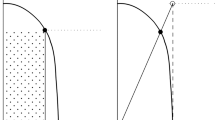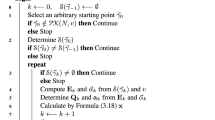Abstract
We introduce a new generating function based method to compute the Banzhaf, Deegan–Packel, Public Good (a.k.a. the Holler power index) and Shapley–Shubik power indices in the presence of incompatibility among players. More precisely, given a graph \(G=\left( V,E\right) \) with V the set of players and E the edge set, our extension involves multiple weighted voting games (MWVG’s) and incompatible players, i.e., pairs of players belonging to E are not allowed to cooperate. The route to obtain the aforementioned generating functions comprises the use of a key lemma characterizing the set of minimal winning coalitions of the game with incompatibility due to Alonso-Meijide et al. (Appl Math Comput 252(1):377–387, 2015), a tool from combinatorial analysis, namely, the Omega calculus in partition analysis, and basic tools borrowed from commutative algebra involving the computation of certain quotients of polynomial rings module polynomial ideals. Using partition analysis, we obtain new generating functions to compute the Deegan–Packel and Public Good power indices with incompatibility leading to lower time complexity than previous results of Chessa (TOP 22(2):658–673, 2014) and some results of Alonso-Meijide et al. (Appl Math Comput 219(8):3395–3402, 2012). Using a conjunction of partition analysis and commutative algebra, we extend to MWVG’s the generating function approach to compute the Banzhaf and Shapley–Shubik power indices in the presence of incompatibility. Finally, an example taken from the real-world, i.e., the European Union under the Lisbon Treaty, is used to illustrate the usefulness of the Omega package, a symbolic computational package that implements the Omega calculus in Mathematica, due to Andrews et al. (Eur J Comb 22(7):887–904, 2001) in the context of MWVG’s by computing the PG power index of the associated voting game.
Similar content being viewed by others
References
Algaba, E., Bilbao, J. M., Fernández García, J., & López, J. J. (2003). Computing power indices in weighted multiple majority games. Mathematical Social Sciences, 46(1), 63–80.
Alonso-Meijide, J. M., & Bowles, C. (2005). Generating functions for coalitional power indices: An application to the IMF. Annals of Operations Research, 137(1), 21–44.
Alonso-Meijide, J. M., & Casas-Méndez, B. (2007). The public good index when some voters are incompatible. Homo Oeconomicus, 24(3–4), 449–468.
Alonso-Meijide, J. M., Casas-Méndez, B., Holler, M. J., & Lorenzo-Freire, S. (2008). Computing power indices: Multilinear extensions and new characterizations. European Journal of Operational Research, 188(2), 540–554.
Alonso-Meijide, J. M., Bilbao, J. M., Casas-Méndez, B., & Fernández, J. R. (2009). Weighted multiple majority games with unions: Generating functions and applications to the European Union. European Journal of Operational Research, 198(2), 530–544.
Alonso-Meijide, J. M., Casas-Méndez, B., & Fiestras-Janeiro, M. G. (2015). Computing Banzhaf–Coleman and Shapley–Shubik power indices with incompatible players. Applied Mathematics and Computation, 252(1), 377–387.
Alonso-Meijide, J. M., Freixas, J., & Molinero, X. (2012). Computation of several power indices by generating functions. Applied Mathematics and Computation, 219(8), 3395–3402.
Andrews, G. E., Paule, P., & Riese, A. (2001). MacMahon’s partition analysis: The omega package. European Journal of Combinatorics, 22(7), 887–904.
Banzhaf, J. F, I. I. I. (1965). Weighted voting doesn’t work: A mathematical analysis. Rutgers Law Review, 19, 317–343.
Bilbao, J. M., Fernández, J. R., Jiménez Losada, A., & López, J. J. (2000). Generating functions for computing power indices efficiently. TOP, 8(2), 191–213.
Bondy, J. A., & Murty, U. S. R. (1982). Graph theory with applications. Amsterdam: Elsevier.
Carreras, F. (1991). Restriction of simple games. Mathematical Social Sciences, 21(3), 245–260.
Chessa, M. (2014). A generating functions approach for computing the public good index efficiently. TOP, 22(2), 658–673.
Coleman, J. S. (1971). Control of collectives and the power of a collectivity to act. In B. Lieberman (Ed.), Social choice (pp. 269–300). New York: Gordon and Breach.
Cox, A. D., Little, J., & O’Shea, D. (2007). Ideals, varieties, and algorithms: An introduction to computational algebraic geometry and commutative algebra. Berlin: Springer.
Datta, R. S. (2010). Finding all Nash equilibria of a finite game using polynomial algebra. Economic Theory, 42(1), 55–96.
Deegan, J, Jr., & Packel, E. W. (1978). A new index of power for simple n-person games. International Journal of Game Theory, 7(2), 113–123.
Dubey, P., & Shapley, L. S. (1979). Mathematical properties of the Banzhaf power index. Mathematics of Operations Research, 4(2), 99–131.
Egorychev, G. P. (1984). Integral representation and the computation of combinatorial sums. Providence: American Mathematical Society.
Einy, E. (1988). The Shapley value on some lattices of monotonic games. Mathematical Social Sciences, 15(1), 1–10.
Faaland, B. (1972). On the number of solutions to a diophantine equation. Journal of Combinatorial Theory (A), 13(2), 170–175.
Fernández, J. R., Algaba, E., Bilbao, J. M., Jiménez, A., Jiménez, N., & López, J. J. (2002). Generating functions for computing the Myerson value. Annals of Operations Research, 109(1–4), 143–158.
Gould, H. W. (1972). Combinatorial Identities. A standardized set of tables listing 500 binomial coefficient summations. Henry W. Gould, Morgantown, W. Va.
Holler, M. (1982). Forming coalitions and measuring voting power. Political Studies, 30(2), 262–271.
Kirsch, W., & Langner, J. (2010). Power indices and minimal winning coalitions. Social Choice and Welfare, 34(1), 33–46.
Lange, F., & Kóczy, L. (2013). Power indices expressed in terms of minimal winning coalitions. Social Choice and Welfare, 41(2), 281–292.
Myerson, R. B. (1977). Graphs and cooperation in games. Mathematics of Operations Research, 2(3), 225–229.
Neto, A. F. (2019). Generating functions of weighted voting games, MacMahon’s partition analysis, and Clifford algebras. Mathematics of Operations Research, 44(1), 74–101.
Neto, A. F., & dos Anjos, P. H. R. (2014). Zeon algebra and combinatorial identities. SIAM Review, 56(2), 353–370.
Owen, G. (1972). Multilinear extensions of games. Management Science, 18(5), 64–79.
Owen, G. (1975). Multilinear extensions and the Banzhaf value. Naval Research Logistic Quarterly, 22(4), 741–750.
Penrose, L. S. (1946). The elementary statistics of majority voting. Journal of the Royal Statistical Society, 109(1), 53–57.
Rodríguez-Veiga, J., Novoa-Flores, G. I., & Casas-Méndez, B. (2016). Implementing generating functions to obtain power indices with coalition configuration. Discrete Applied Mathematics, 214(11), 1–15.
Schott, R., & Staples, G. S. (2012). Operator calculus on graphs theory and applications in computer science. London: Imperial College Press.
Shapley, L. S. (1953). A value for n-person games. In: Contributions to the theory of games II (Vol. 28, pp. 307–317). Princeton: Princeton University Press.
Shapley, L. S., & Shubik, M. (1954). A method for evaluating the distributions of power in a committee system. The American Political Science Review, 48(3), 787–792.
Wilf, H. S. (1990). Generatingfunctionology. New York: Academic Press.
Yakuba, V. (2008). Evaluation of Banzhaf index with restrictions on coalitions formation. Mathematical and Computer Modelling, 48(9–10), 1602–1610.
Acknowledgements
AFN would like to thank the financial support of CNPq (Conselho Nacional de Desenvolvimento Científico e Tecnológico) under grant 307211/2015-0. CRF would like to thank FAPEMIG (Fundação de Amparo à Pesquisa do Estado de Minas Gerais) for a graduate scholarship.
Author information
Authors and Affiliations
Corresponding author
Additional information
Publisher's Note
Springer Nature remains neutral with regard to jurisdictional claims in published maps and institutional affiliations.
Rights and permissions
About this article
Cite this article
Francisco Neto, A., Fonseca, C.R. An approach via generating functions to compute power indices of multiple weighted voting games with incompatible players. Ann Oper Res 279, 221–249 (2019). https://doi.org/10.1007/s10479-019-03191-5
Published:
Issue Date:
DOI: https://doi.org/10.1007/s10479-019-03191-5




